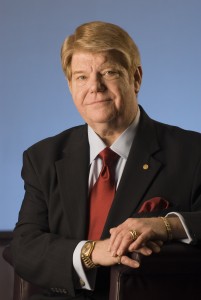
UPDATED with comments from Judge Milton Hirsch, Judge Miguel de la O, and Ed Shohat -- others in the comments:
1. Like you, I could tell stories about lunches we had, drinks we had, NACDL events we enjoyed. But I know -- and you know -- what stories he'd want us to tell. He'd want us to tell trial stories.
Once upon a time we had codefendants in a multi-defendant
case in federal court in Gainesville. I took a room at a place named
Johnson Howard's, or something like that. Neal took two rooms -- one for
him to sleep in and one for him to prep in. He laid in a supply of
ready-to-eat food, he locked himself in his rooms, and he prepped for trial
into the wee small hours every night.
At the close of the government's case in chief, Neal moved to dismiss for failure of venue. I did too. (I believe my actual argument was, "Um . . . me, too.) The motion was granted. (All other defendants were stuck in trial to the bitter, and unwelcome, end.) Upon the granting of "our" (Neal's) motion, my client started babbling about how his innocence had been vindicated. Neal and I dragged him out of the courtroom (Neal's sensibly silent client bringing up the rear) and back to Miami.
And I was disappointed. I had seen and heard Neal in
closing on a number of occasions, and I was actually sorry that I wouldn't get
to see it again in that particular trial. Think about how good he had to
be: I was actually a little disappointed, all the way from Gainesville to
Miami, that I got out on a Rule 29.
He never turned away a fellow criminal-defense lawyer who had a question about best trial practices, and he never made a fellow criminal-defense lawyer feel foolish for asking. His late dear friend Albert Krieger was like that, too. Now they're both gone. Those who didn't know them will never know how much they've missed.
Ilene joins me in sending love and condolences to Pat.
Milt Hirsch
2. Neal
was a lawyer's lawyer and the epitome of professionalism and ethics. He, Jon
Sale, Ben Kuehne, and David Tucker saved me from a career of only practicing
civil law. I was his associate for nearly four years. Neal "second
chaired" my first federal criminal case. And he did me the honor of
speaking at my investiture. My admiration and respect for him is boundless.
Soon after starting the criminal division, Neal was counsel on a matter. I
disclosed my history with Neal, but the prosecutor didn't ask me to recuse. So
I brought them side bar and told the prosecutor to rethink his position because
he would never be able to convince me that any representation Neal made was
anything other than 100% accurate. Neal was so respected that the prosecutor
not only refused to recuse me but said he would take Neal's word over his own!
Neal was also incredibly generous. When I formed my own firm, he let me and my
partner use two of the offices in his suite rent-free for months. A mitzvah I
never forgot and when I paid it forward, I made sure to give Neal credit.
He will be dearly missed. May his memory always be a blessing to Pat, his
family, and the legal profession. I know it will be to me.
--Miguel de la O
3. Neal Sonnett was the embodiment of a lawyers’ lawyer. He was, quite simply, the most skilled trial lawyer I have ever known.
But
well beyond his impressive skills as a trial lawyer, Neal was unremittingly
devoted to protecting and improving the profession. His unparalleled work for
both the NACDL and the ABA, as both a leader and innovator will stand the test
of all time greats. For just one example, it as through Neal’s and Al Krieger’s
tireless work that Congress amended the money laundering law to add a safe
harbor for legal fees to 18 U.S.C. section 1957, Transaction Money Laundering.
News of Neal’s passing has already produced an avalanche of tributes to “the Lion of the bar”. And that is exactly what Neal was.
As a longtime mentor, law partner and friend, I will never forget Neal.
--Ed Shohat


